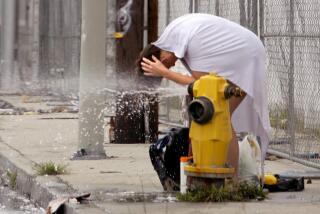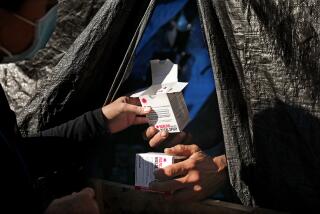Rise in HIV Infection Rate Disputed : Health: The president of an AIDS foundation claims research shows the virus is spreading rapidly among the poor. The county says data is being misinterpreted.
- Share via
An AIDS-care organization warned Thursday of an “alarming” rise in the rate of HIV infection in some segments of Los Angeles County’s poor populations, but county health officials dismissed the group’s statement as a misinterpretation of research figures.
The president of the AIDS Healthcare Foundation said that results from the county’s random HIV testing program suggested that AIDS may be about to explode among the poor in much the same way it did with gay men a decade ago.
“We ought to be very, very concerned,” said Michael Weinstein, the organization’s president.
Weinstein cited county test results that showed a 50% rise in the infection rate at homeless clinics and a 44% increase at tuberculosis clinics between 1991 and 1990. “I just feel that these levels of infection are alarming,” said Weinstein, who called for the formation of a blue-ribbon commission to deal with the “crisis” and promote testing efforts.
But Dr. David Dassey, deputy medical director for the county’s AIDS programs, discounted Weinstein’s reading of the test results. The data “does not prove the point that he is trying to make,” Dassey said.
While more people with HIV and AIDS have become homeless and are developing tuberculosis, there is no evidence that the HIV infection rate is increasing significantly among the homeless and tubercular populations, Dassey said. The county testing is part of an ongoing series of studies and is not indicative of new infection rates, he added.
Moreover, although the percentage increases cited by AIDS Healthcare were great, the numbers were not. The number of people testing positive for HIV, the virus that causes AIDS, at homeless clinics rose from nine of 304 tested in 1990 to 24 of 532 last year.
The number of people testing positive at tuberculosis clinics rose from 53 of 695 tested to 69 of 625.
Weinstein argued that the increase is significant and said the county should greatly expand its anonymous testing program. Too many people, he said, are not getting tested, do not know they are infected with the AIDS virus and are not do anything to prevent its spread. “We need to focus on preventing infection,” Weinstein said.
More to Read
Sign up for Essential California
The most important California stories and recommendations in your inbox every morning.
You may occasionally receive promotional content from the Los Angeles Times.














